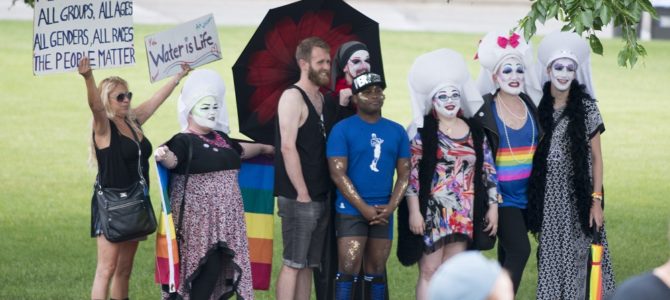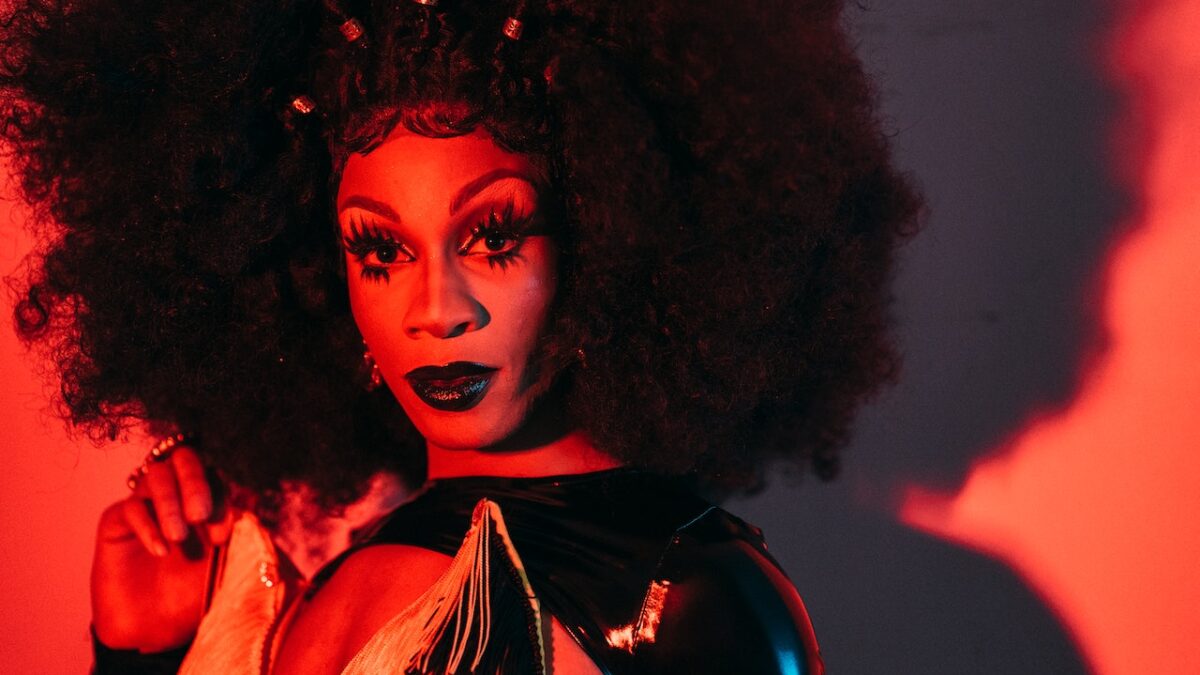
The LGBT term “non-binary” has been popping up lately, from Vox’s tribute to women and non-binary photographers, to states like Washington allowing a third gender option (X) for birth certificates and driver’s licenses. The Washington law defines the “X” gender designation as, “A gender that is not exclusively male or female, including, but not limited to, intersex, agender, amalgagender, androgynous, bigender, demigender, female-to-male, genderfluid, genderqueer, male-to-female, neutrois, nonbinary, pangender, third sex, transgender, transsexual, Two Spirit, and unspecified.”
The most common and widely used definition of “non-binary” is “genderqueer,” which indicates the full spectrum of people who do not identify as either male nor female––people who identify as some blending of both or people with other concepts of alternative gender.
What Do All These Terms Mean?
Truthfully, the differences between the stated categories are minimal. For example, agender, androgynous, neutrois, and nonbinary all describe the same sensation of having no gender, when compared to male and female. Amalgagender, bigender, demigender, genderfuid, pangender, third sex, and Two Spirit indicate some blending of the two sexes to one degree or another.
The other options indicate a transition from one gender to the other, although modern transgender messaging insists that none of the above listed options are finite or reliably defined. It comes down to the individual and his or her own preferences at any given time. While members of the LGBT community argue these classifications of human gender and sexuality are separate, distinct, and natural conditions of humanity, the reality is they are simply detailing what has always been understood as individuality. Not all people experience all things in the same way.
As someone with direct experience in this introspective analysis, I believe these distinctions are fairly irrelevant to normal, everyday life. It is puzzling to me to see the concept as dramatically expressed as it is by LGBT media and advocacy. Gender conformity matters more in childhood than it does in adulthood as it seems, regardless of the efforts of the adults around them, children self-segregate into male and female peer groups.
This was particularly challenging for me as a child, because I identified with my female classmates more closely than my male classmates. I was daily aware how unlike the other boys I was was. Left on my own, I played with the girls, talked with the teachers, and gravitated towards the girls’ toy selection. My favorite colors were pink and yellow, and I drew princesses and flowers constantly.
My perception was always that girls had easier and more enjoyable social experiences, and male behavior expectations were tedious and absurd to me. I simply did not understand why everyone wanted me to change my behavior––everything from the way I talked to my body language to my personal interests––to be more like the boys, whom I viewed as idiot barbarians.
I did not understand the social hierarchy or interactions in the male world, from my own peer group to teenagers to adult male gatherings. Leave me with a group of middle-aged women, however, and I was right at home. I found female dress, makeup, hair, and jewelry fascinating, and I thought I was a girl trapped in a boy’s body well into my late teens and early twenties.
Despite All This, I Know I’m Male
Masculinity always felt like a set of skills I needed to learn but could never really understand. I fixated on masculine behaviors and attempted to mimic them, but it always felt like acting. On the other side of the spectrum, my attempts to dress as a woman, change my voice, or imagine a female version of my name felt equally fabricated and forced. When left alone, I was more or less, well, non-binary.
In all honesty, I cannot articulate what it means to feel like either a man or a woman. I can list gender stereotypes I have learned from media and observation. I can go into great detail about the differences in psychology and behavior I have studied in both sexes my entire life. But I simply cannot tell you what either feels like personally. It’s all mimicry and acting to me. When I am “myself,” I do not feel a sense of gender at all, and find that the perception of masculinity or femininity depends on who I am around.
The point of this observation is to illustrate what those on the trans spectrum articulate to one degree or another and to humanize the experience. For me, strict gender stereotyping is unnatural. I have absolutely no idea if most people understand that concept, but from my interactions, I have concluded that most people seem to have a pretty clear idea of what male or female means to them. It is equally possible that those who transition experience just as strong a personal knowing as the majority of the population. I can only speak to my own perceptions. But I can objectively tell you I am male.
I know I am a male because of my anatomy and regardless of how I have felt about my body, my social interactions, or my personal sense of self, I am a human male. There are people born with bodily anomalies that make this distinction legitimately difficult, and it is true that not every person has either XX or XY chromosomes.
But the objective reality is that the vast majority of people are either male or female and feel unquestionably as one or the other. This really brings me to my point on the relevancy of gender identity in the abstract. Regardless of how I have felt over time or my internal sense today, the fact remains that my body is male and that is the sex I should abide by in terms of legal classification and interactions with sex-segregated situations. Why? Because it simply makes sense.
My health indicators are male. If I experience a heart attack, I will have the symptoms of a male. Even if I pump myself full of estrogen and testosterone blockers, my body will forever attempt to reestablish itself as male. To this end, the concept of a third sex for identification purposes is irrational. It is also completely ineffective.
What possible point would there be for me to put “X” on my driver’s license when my sex is not controversial to the casual observer? Even if I dressed in stereotypical female clothing, it would not alter my physical anatomy. The fact that I do not experience a specific gender in no way affects my sexual orientation, either. In truth, my sense of gender does not affect anything in my life outside of an awareness of not fitting in with conventional sex-segregated social activities.
Outward Gender Expression
I choose to wear male clothing because I look ridiculous in female clothing. It really is as simple as that. In truth, the most common outward expression of genderqueer individuals seems to be adopting stereotypical aspects of the opposite sex. In our culture, this is a perfectly acceptable option. It just is not one I choose.
I advocate for adults who do choose to express themselves using the full palette of style, fashion, and accessories in any way they like. But I find it unnecessarily confrontational to demand specialized protections, designations, laws, or mandatory pronouns in order to do so. Our culture of self-obsession has made an interesting quirk about a person far more burdensome than it should be. Growing up is hard for everyone, but as an adult you get to be whomever you choose. We should celebrate that rather than complain that not everyone acknowledges it in the precise way we wish.
I think the biggest shift in mindset for me came when things like how I personally experienced gender were no longer priorities. Building a career, battling through a serious illness, and starting my life with a new person changed my perspective on introspection. Spend enough time in your own head, and you’ll find a remarkable number of things to fixate worry on. It’s when you live outside of yourself and experience life with others that these things lose their importance.
I think that is the difference between being genderqueer and having gender dysphoria. One allows you to explore how you wish to express yourself, while the other becomes an unhealthy obsession that limits your ability to function without intervention. Much of the LGBT community is sadly pushing self-exploration into unhealthy obsession.
I also have lost the need to be validated for my gender as either a man or a woman. I recognized that most men think I am feminine, and most women think I am perfect. I like who I am, and I gave up trying to be somebody else.
The left will continue to designate ever more slight differences in experience and perception under labels they demand require special treatment and protections. But in the end, it is simply the progressive way of attempting to understand individuality. For most of us, the categories are truly meaningless in everyday life.









